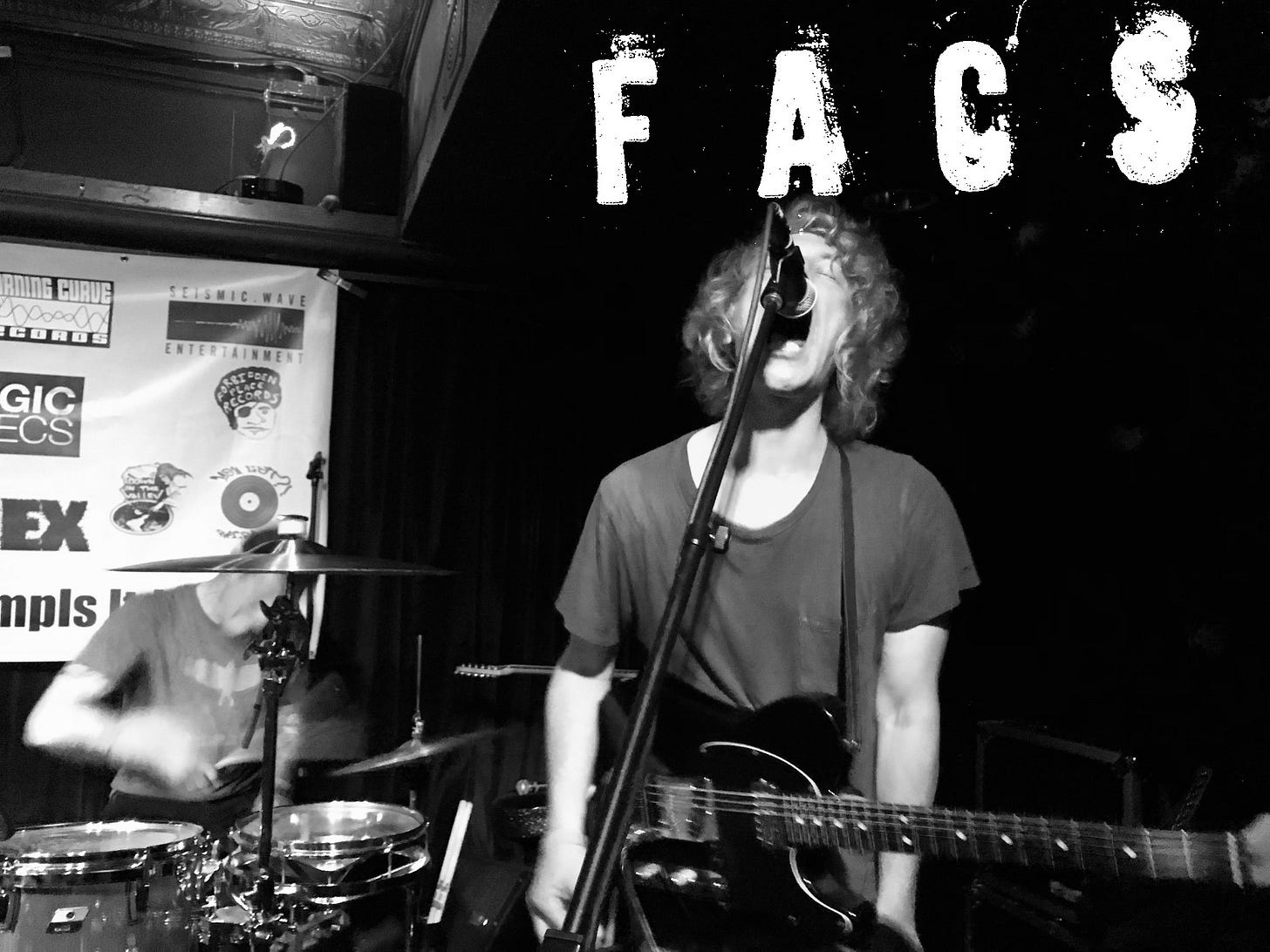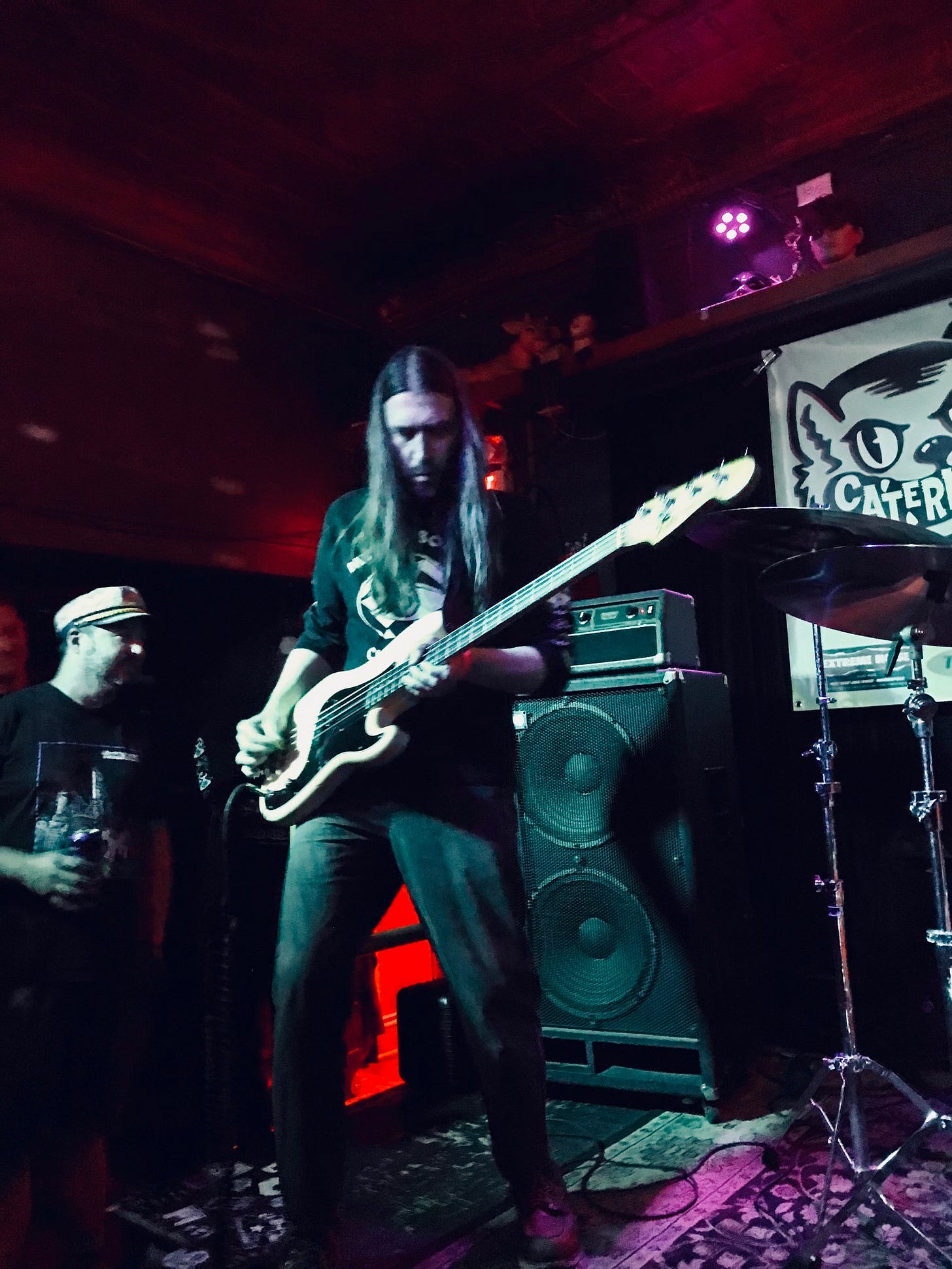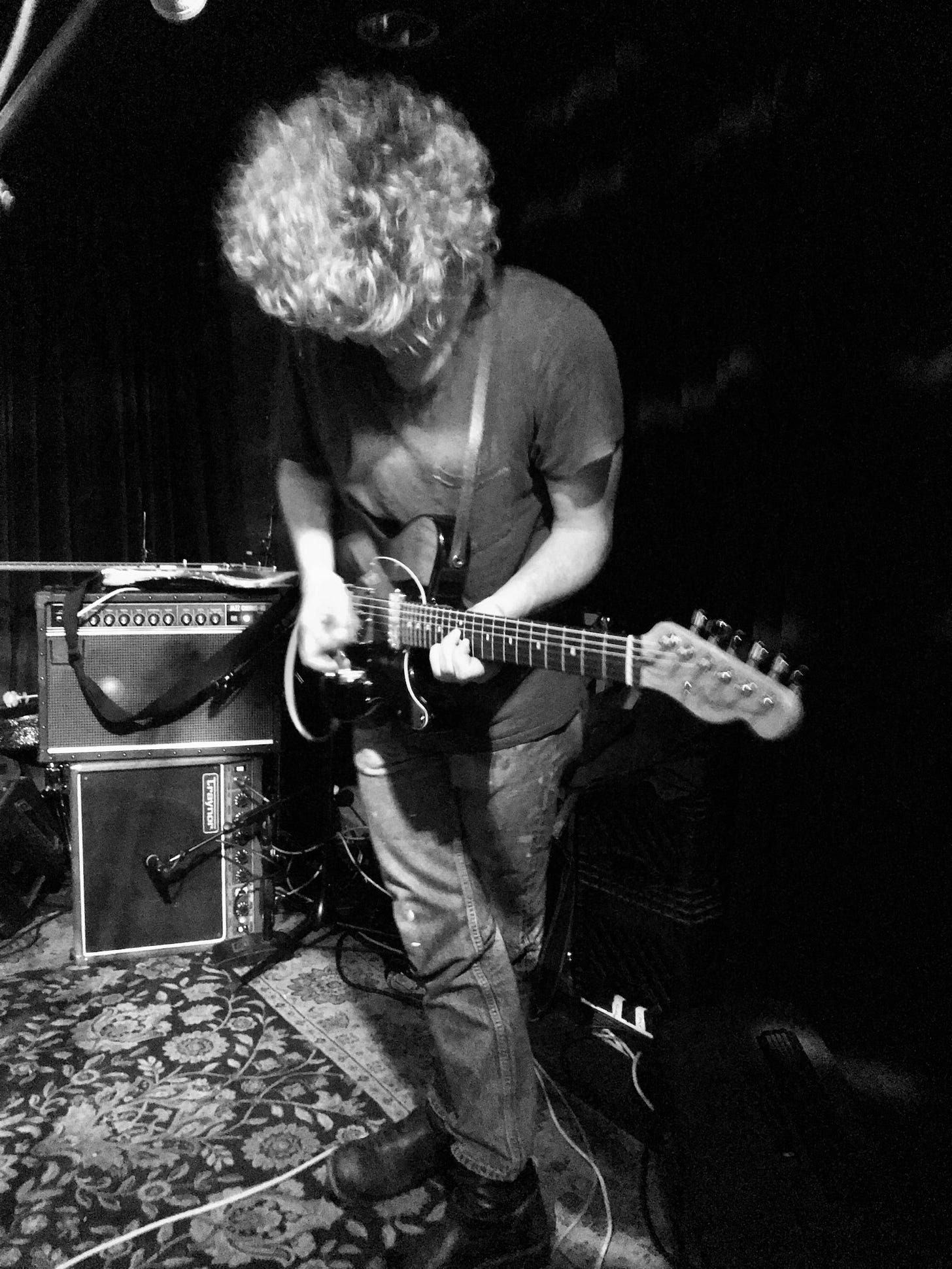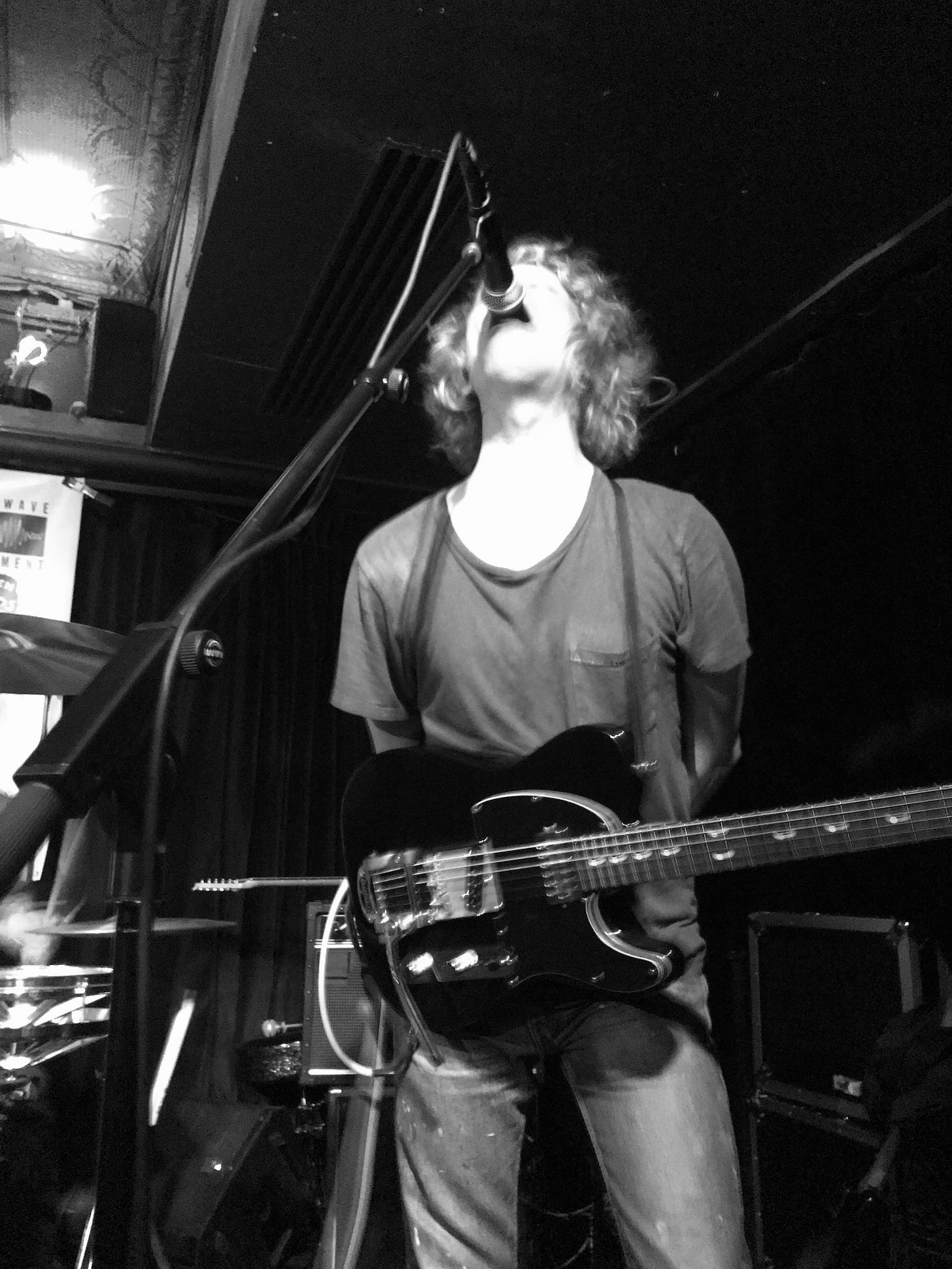I didn’t ‘get’ FACS when I first heard them. I was dismissive. Yet to any potential listener they require attention. They’re a band for people who like to listen to albums and not just quickly digested singles to be forgotten a week later, as guitarist/vocalist Brian Case describes in our conversation. To follow up on my own experience I really ‘got it’ once I saw them live because each member is an incredible player. I immediately went back to their recorded material and fell in love with all of it. As I listened more certain elements began to emerge to me and I got curious about where Case and his bandmates became the musicians that they are. What I discovered was a rich history of chance encounter with DIY culture and the good fortune of finding that person in your town who puts good music in your hands and opens doors for you, not to mention the undeniably strong community of bands and collaborators throughout the band’s chosen home of Chicago that keep each other motivated and inspired. It’s the DIY ethos we all strive for and while FACS does not sound like the type of band you’d hear at a typical basement show you know they’ve all spent their fair share of time playing them and I wouldn’t put it past them to do it again. In February they released one of my favorite records this year and they’ve steadily been on tour for it ever since. So you know what to do if they come out your way.
As an admission, when I first heard FACS I think I gave it a quick listen and thought, ‘this is too artsy. I like artsy stuff, but this is too out of my realm’. And then I saw you open for Metz and realized I was wrong, I thought it was actually very cool. And then I got more into the music. So I sometimes wonder, ‘who is your audience?’ Listening to FACS it sometimes sounds like it could be performed in a museum, but when you do play live it’s very much a live experience that lends itself to more traditional venues and spaces.
Yeah, I think it’s just a product of us all growing up playing in basements and doing all ages shows. So we’re really steeped in that early 90’s DIY, Dischord, Touch and Go style of music. It’s what informed us. So we’re coming from that world, but as we’ve played in a thousand bands and gotten older we have gotten interested in more abstract stuff and focusing more on a concept or idea as opposed to just subscribing to a way that a song has to be. We like exploring texture. FACS, in particular with Noah (Ledger, drums) and Johnathan (van Herik, bass) are such a solid rhythm section; they’re so good together. They really hit hard. So I see my role in the band more as staying out of their way. They create more of the tension and propulsion and I’m just trying to put texture on top of that and turn the mood around a little bit. So I play less and more abstract than I would if I was playing something that was more reliant on songs and structure.
I read a couple other interviews and in one you made a mention of influence from a lot of DC-Dischord style stuff and at first I thought that seemed off-base. But after thinking on it a bit it really clicked that some of FACS sound takes a lot from the Alex Dunham-style of bands like Hoover and Regulator Watts where the guitar has a lot of noisey texture while these incredible rhythm sections are just going at it.
That Hoover record…. I wore that record out. I love that album. Hoover, Circus Lupus, obviously Fugazi, Slant 6 and The Warmers…. that mid-90’s era of Dischord was really up my alley. And Unwound too. I love that they were coming from a hardcore world but there’s tons of abstract ideas and I think they really went out of their way to incorporate something different and that was always really influential to me.
I think that’s my favorite Dischord era for me as well, but I think that has more to do with my age and where I was at the time. The early 80’s Dischord stuff is super important and influential as well, and informed a lot of my ethics, but it’s the music of the early-to-mid-90’s era that I found so interesting.
But as you said, the less-is-more approach and how I didn’t initially put together that Dischord influence because I’m thinking, this dude is from Chicago, there’s a whole universe of Chicago bands they probably take influence from’. Chicago is kind of known for having all these bands with incredible rhythm sections.
Yeah, there’s a lot of good drummers here.
But I think that less-is-more approach shows up in the lyrics too. They’re very minimal.
It’s kind of meant as another rhythm element, sort of in the way the cadence goes at times. But I put a lot of thought into what I’m saying and try to have a point or purpose without it being so obvious. The lyrics are still relatively abstract but I feel like it’s more of a function of letting people put their own meaning on to it rather than me spelling out exactly what I’m getting at.
You’re a pretty prolific band and in another thing I had read you mentioned something along the lines of remaining that way because there was this idea that if you don’t use it, you lose it; like losing a skill. Do you approach your music making with that same sort of idea of maintaining a skill?
Yeah. For us it’s that since our last band together- Disappears- we’ve had a practice day at noon from 12 to 3 for over a decade. And that’s the time we all sort of base our weeks around- ‘I got band practice Monday. I’m going to get together with the guys and we’re going to write. Some times we just sit around and talk, some times we’re rehearsing, some times we play a lot of music. But having that regular part of our schedule is super important for us. So we’re playing together every week, we’re not scheduling a practice when it’s convenient for everyone. We’re starting with this. With that in mind, the idea we have is to write a half-hour of music every year. Every year come up with 30 minutes and that’s the next record. That gives us a goal to work towards as well. It’s not just rehearsing and having a good time. We’re also conscious to get 30 minutes of music written each year, and then you can record it, and that will be our next record. It keeps us on some sort of trajectory, or path, without being limiting or strict in what we feel like we should be doing. We just keep that in mind and it keeps us moving forward.
That’s a very workmanlike approach.
It feels like a pretty Midwest sort of thing (laughs)
I suppose! But it sounds like a job.
Sure. I treat it like a job, or a practice, or an art. This is the time we spend thinking about music, and sharing our views, and talking to each other, and that’s important for us every week because we have the space to do it we can set up some ideas, or goals, about what we want to do during that time.
Speaking of your last band Disappears I wasn’t too familiar with it, but when I listened to some of it I could see where that led into FACS. But at one point Steve Shelley from Sonic Youth played with you and I’m curious how that came about.
We had become friends because we had a mutual friend who worked for Sonic Youth. He was their monitor guy. So when our band Disappears was first starting he had a band called White Light and owned a recording studio. He brought Steve to come see us once and he liked it, and Sonic Youth was doing a tour that started in Chicago. So Steve had some time before that tour started so our mutual friend thought it would be a good idea to get Disappears and White Light and Steve into a room for two days, record it all, and see what happened. We hadn’t put out a record or anything at that point. So he ran the idea by Steve and he was into it, so we did it and it was fun. We recorded a bunch of music and we just kept in touch with Steve. He was a fan of the band and Sonic Youth is my favorite band, so that was cool.
At some point the drummer of Disappears moved to Portland, and we thought, ‘let’s just ask Steve. When he says ‘no’ we’ll just do a real search for a new drummer’. But he said ‘yes’.
We had a record that we had already recorded but it hadn’t come out yet. So Steve came to town and learned a bunch of songs, and did a bunch of tours, and ended up making a record together, and it was during that time that Sonic Youth stopped playing. Steve started playing in a bunch of Thurston Moore’s solo projects. It got really busy and Steve lived in New York, and we lived here, and it just became a little too difficult to coordinate the schedules. But I love Steve and we remain friends and it was so fun to play with him. We got to go all over the world and did some really cool shit. I mean, we recorded in Sonic Youth’s studio.
No big deal.
(laughs) Yeah! No big thing, just hanging out together.
So you mentioned this Chicago-Midwest thing, but you’re not originally from Chicago, correct?
I’m from Saint Louis.
How was your upbringing around music in that area?
It was cool. There’s an amazing record store there called Vintage Vinyl. One of the guys who worked there, his name was Jim, if I went to buy something he would say, ‘oh, if you like this, you should check this out’. And he really taught me a lot about music. He also worked at a club there that’s no longer around called Ciceros and he was the door guy. He had talked to the owners and worked it out that if he was working I could go to the shows because I was only 16 or 17 and it wasn’t an all ages place. So I was getting to see all these bands play and Jim was feeding me records.
All during this time I had been playing music with friends in high school and middle school. There was an all ages club in town called Bastilles and lots of Dischord bands played there. So I saw Hoover there. Circus Lupus didn’t play there but they did come through town. There was someone in town that was bringing cool bands to St. Louis.
Like, ‘who is this person?! I need to find them!’
Yeah. There was a woman named Marla, she booked at Ciceros, and then these two guys had a production company called Killer Shrews. And they were going to Washington University, which was the university in St. Louis. They knew all the DC people and I think they were from there. So they would get their friends to come to town when they were on tour- like ‘come to St. Louis and see me and play a show!’ sort of thing.
So I actually had access to awesome music and shows. And I had this great resource in Jim. Fugazi came through a bunch because they toured all the time. And it was just a cool scene there growing up and it was enough of a scene where we were able to play shows and have a band that didn’t 100% suck.
When the all ages club closed this woman Amanda started doing basement shows and we would play there and would meet people from all over the country. It really naturally and organically blossomed into me continuing to pursue music.
That’s fortunate. In the time period you’re describing you really just kind of had to know someone. It all felt like a secret. And when you found that person that’s such a eye-opening resource.
Oh my god, yeah. It’s like, ‘this is what I want to do, this is my world’.
It was kind of treasure hunt back then.
And like you said earlier, or you alluded to, discovering a lot of that Dischord stuff you’re also inheriting these ethics and ideas about how you want to live in the world, and what to prioritize, and what’s important to you, and that’s so inspired to me.
I agree. So, in that case, if you were surrounded by something cool and had access to cool things, what lead you to want to go to Chicago?
Two of my friends- I had played in a band with one of them and one was just in a band that I liked- they graduated a year or two before and had moved to Chicago to go to school at Columbia College. I went to visit them and I was about to graduate high school, and wasn’t sure if I would stay in St. Louis or not. So I stayed with them and I had a really great time in Chicago and they said, ‘why don’t you move here and we’ll start a band’. So I just said, ‘OK, I’ll do that.’
It sounded cool. I was ready to get out of St. Louis and Chicago sounded cool. It was the mid-90’s and the first Shellac record had just come out. The first Tortoise record had just come out. Touch and Go was in a really cool area at that point with what they were doing. It was a young scene and it was really inspiring and I wanted to be a part of it. It’s a bigger city. It’s grittier and there’s a lot going on and I was ready to leave St. Louis.
I’ve always been fascinated with Chicago and the community there. I’ll hear all sorts of bands and things that tie them together, but as disparate as they might sound from one another you find out later they all know each other. And it’s this huge city and everyone knows each other.
It’s awesome. The community here is so supportive and embraces each other regardless of genre or style. The jazz guys are hanging out with the rock guys and you’re all going to the same bar and talking. You’re all trying to do the same thing- to play music. You’re going to the same clubs, just different nights of the week, and getting in the van. Everyone is so supportive of each other and because of that there’s a lot of blending of genre and personnel. So jazz guys are playing with rock guys and everyone is interested in what everyone else is doing. So the concepts and styles bleed over and there’s a lot of shared influence and conversation.
It seems that sort of communal idea carried over with how your most recent record “Wish Defense” was completed. It was tracked and you had other people help finish the mix. Who did you have come to help you with that? Because it was very sudden.
It was cool because the last couple records we had made with our friend Sanford Parker, who is more known as a metal guy. We’re fans of each other and friends, he’s great to hang out with and great in the studio. So initially he came in to help us finish the last day of tracking and about a month later we mixed it with our friend John Congelton, who we’ve also made a bunch of records with. He did a bunch of the Disappears records, almost all the FACS records, though he only recorded the first one. But he’s mixed the rest of them. But he’s a great friend and both those guys were really close with Steve Albini, so it felt good to have these friends of his come in and tie up the last bit of work he was able to do before he passed away.
Those guys are great. They wanted to be a part of it and we wanted them to be a part of it.
But figuring it out was very last minute though? They kind of came in on the fly.
Sanford came in a day after Steve died and helped us wrap everything up so it was done. We were actually very close to being done recording and were about to move into the mixing stage when Steve died. Sanford dropped everything, came in, and helped us get that done. And when John heard he knew we were recording with Steve and he called and was like ‘I’m there, let me know when you want me to help.’ It was really cool.
That community spirit is great. So when I think of your band I think of you all being musicians first and the selling of the art is secondary, which is sort of the case with a lot of musicians- they’re not great at marketing. It can be cheesy and I get why bands sometimes don’t put a big effort into that part. So I don’t think of FACS as being that way intentionally, but almost by mistake, like you have some cool mystery that occasionally comes up. Specifically, I heard at one point you had a hotline?
We did. The record that was for was a record called “Void Moments”. And we were just thinking that everyone is in a band, everyone is putting out a record, everything goes on to your phone immediately, and it feels like it just vanishes. We like to make music for people who like to listen to music. We have record collections. We have long histories of participating in music, thinking about it, talking about it. So we want to appeal to people like that. We thought, ‘how can we find people who think about music the same way we do?’ So the hotline was just this way to draw people into those ideas. It was kind of mysterious. We put up these posters all over Chicago and, I’m not kidding, it was the day before the pandemic and lockdown.
I think it could have been explored, or gone a bit further, if people were able to leave their house. But the weird thing was there were these wheat pasted posters all over Chicago that didn’t even have our name on it. They just said, ‘are you experiencing void moments’ and it had this phone number, and you just called it, and it had a message, and you left a message.
I think people were seeing it and it was just fucking weird. We got the craziest messages. It was insane. And nobody knew it was about us. The record eventually came out. But so many people weren’t even engaging with it as something a band had done. People eventually started to figure it out. But it was a way to find people who were interesting, or had ideas that aren’t mainstream. It was so fun and cool. If you go to our bandcamp we made two episodes of a radio show where we strung all the messages together. I did all this incidental music over it. We’re all into stuff like Outer Limits and Twin Peaks, and our influences extend beyond music, and it felt like a way to connect the two things and find people outside our normal crew of friends or listeners.
So the “Void Moments” thing was almost a fluke. And it was all free. It was a google phone number so it was free. We didn’t spend any money except for the wheat paste posters. It was just extra weird because it coincided with the pandemic. We could have never predicted that. We haven’t done anything that cool since.







